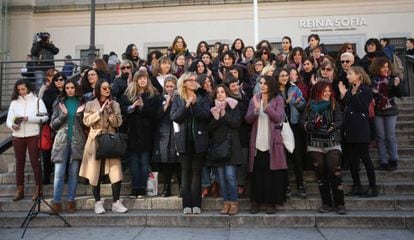One in three Spanish women has felt sexually harassed, new poll finds
In a country in which barely any statistical data exists on the issue, experts and unions believe that the problem is going under-reported


A new survey shows that around one out of every three Spanish women (32%) has felt sexually harassed at least once in her life. This figure rises to 47% among women in the 18-34 age bracket, at a period in their lives when they are going to university or getting their first job.
The survey, conducted by the pollster Metroscopia, also shows that one out of every four women has been groped, or attempts at groping were made, at least once.
Women do not report it out of fear of losing their job
Cristina Antoñanzas, UGT labor union
These figures go some way toward shedding light on a reality that both experts and unions believe is going under-reported. There is barely any statistical data in Spain to help understand the real magnitude of sexual harassment.
The global #MeToo movement against sexual abuse seems to have helped uncover thousands of cases of women who are exposed to this kind of treatment, either at work or on the street. Around 79% of survey respondents believe that sexual harassment is now being discussed more openly because of increased news coverage.
For the first time, women across Spain have been asked to strike on March 8, Women’s Day, to protest discrimination. The stoppage has taken on political overtones, with the governing PP calling it a protest “by feminist elites, but not by real women with everyday problems.” Leftist parties, however, have backed the initiative, and the majority unions CCOO and UGT are proposing that women workers stop for two hours on Thursday.
No data
Spain’s Gender Violence Observatory has said that it is going to start tallying up sexual harassment complaints in order to raise their public profile. Until then, however, there are no available statistics charting court rulings or reports of inappropriate behavior, which can range from offensive jokes to groping on public transit networks, or a boss suggesting that accepting his sexual advances will get a woman workplace benefits – or, on the contrary, that refusing him will imperil her career.
The Metroscopia survey shows that 56% of respondents believe society does not take sexual harassment prevention seriously. This rate is slightly higher among women (61%). Broken down by political affinities, voters of the conservative Popular Party (PP) are more likely to feel that action is already being taken to address sexual abuse.

“Now is when sexual harassment is starting to become visible and taken into account,” says Cristina Antoñanzas, vice-secretary at the labor union UGT. “Earlier, at companies, you would always be told, ‘That doesn’t happen here’.”
Campaigns such as the #MeToo movement are making companies “more open to introducing anti-harassment measures,” adds Antoñanzas, who nevertheless thinks that this is due “more to a question of image than of protecting the victim, since companies were showing no interest in this issue until just a few months ago.”
“Businessmen don’t want women going around saying that they’ve been harassed at their company,” she adds. “Women do not report it out of fear of losing their job, and because they don’t want to be stigmatized by the pervading attitude of ‘she must have asked for it’.”
Widespread support for the strike
The feminist strike of March 8 is justified, according to 82% of Spaniards. Marchers will protest discrimination against women, gender violence and structural inequalities at home and in the workplace.
One of the strike’s main demands will be greater action against the salary gap: Spanish women still earn 23% less than men, according to the National Statistics Institute (INE). And 93% of childcare leaves are taken by women, according to a UGT labor union report.
The Metroscopia poll shows that 66% of Popular Party (PP) voters feel the strike is justified, compared with 73% of Ciudadanos voters, 88% of Socialist Party (PSOE) voters and 95% of Podemos voters.
The poll also shows that 80% of respondents feel Spain is a predominantly sexist society. This number rises to 87% among female survey-takers, compared to 72% of men.
Spaniards believe that there is greater sexism here than in other European countries (47%), but there is also widespread perception that conditions have improved in the last 20 years: 65% of respondents rejected the notion that there is more sexist behavior now than there was two decades ago.
English version by Susana Urra.












































